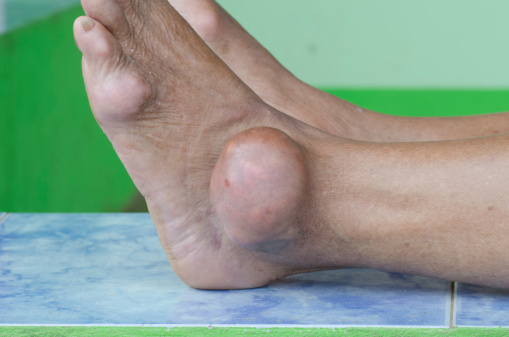 Gout is one of the most painful forms of arthritis. It occurs when there are high levels of uric acid in the bloodstream, which then causes crystals to form and multiply until they surround the joint.
Gout is one of the most painful forms of arthritis. It occurs when there are high levels of uric acid in the bloodstream, which then causes crystals to form and multiply until they surround the joint.
Uric acid is produced when the chemical purine is broken down in the body. Purine naturally occurs in the body, but it is commonly found in many foods.
The good news is that doctors came to the conclusion that a “gout diet,” or a restricted diet, can assist in decreasing uric acid levels in the blood. Although it is not an all-out cure, this can lower the risk of recurring gout attacks.
Foods to Avoid if You Have Gout
1.Seafood: If you have a gout flare-up, avoid certain seafood, including tuna, scallops, herring, anchovies, sardines, trout, haddock, mussels and mackerel. These foods are high in purine—remember, uric acid is produced when purine is broken down in the body.
2.Red Meat: Along with seafood, red meat is rich in purines, so it’s best to avoid eating it when you have a gout flare-up. And when your gout is at bay, keep it safe when it comes to meat. White meat tends to be better than red meat when it comes to purine content. At the most, consume a minimum of four to six ounces daily.
3.Turkey: Turkey and goose contain high amounts of purine, so it’s best to avoid them (or any type of wild game.) Opt for chicken or duck instead.
4.Beer/Alcohol: Beer increases the uric acid levels in your body and it is extremely difficult for your body to flush out. The occasional glass of wine should be fine, but during a gout flare-up, it’s best to avoid alcohol altogether.
5.Sugary Drinks: Avoid beverages that are rich in high-fructose corn syrup, including sodas and fruit drinks with added sugars. The sweeteners in these drinks will fuel the body to produce even more uric acid.
Common Gout Triggers
1.Being overweight: People who are overweight or obese tend to suffer from gout due to poor eating habits that increase the level of uric acid in the blood.
2.Alcohol: Critical alcohol attacks are typically triggered by overindulging in alcohol. If you are prone to gout attacks, try to cut down or eliminate drinking altogether or; if you must drink, opt for a glass of wine instead of beer.
3.Kidney disease: Diseases that help prevent the kidneys from properly functioning–and from flushing out uric acid–can cause gout. To keep your kidneys healthy, drink at least six glasses of water a day and one glass of water before you go to bed.
4.Drugs: Chemical compounds, such as drugs, can decrease the elimination of urates that can trigger a gout attack.
Adopting New, Healthy Habits
It’s best to adopt a healthy diet that includes nutritious foods that are low in purines, including:
- Low-fat/non-fat milk, yogurt, and dairy products (it’s interesting to note that dairy products might lower your risk of gout)
- Fruits and green veggies
- Breads and cereals
- Nuts and peanut butter
- Coffee (Studies show that moderate coffee consumption may be associated with a reduced risk of gout because it can lower serum uric acid levels)
Gout-Friendly Meal Ideas!
Breakfast:
- 1 slice of whole-grain toast
- 1 glass of water
- 1 cup of fresh strawberries
- 1 cup of whole-grain cereal (with skim milk)
Lunch:
- 2 chicken breast slices
- 1 whole-grain roll
- 2 glasses of water
- 1 cup of low-fat milk
Dinner:
- Roasted salmon
- 1 cup of steamed green beans
- 1/2 cup of whole grain pasta (with lemon pepper sauce)
- 1 glass of water
- Herbal tea (to help with the digestion)
Any lifestyle or dietary changes should be brought to your doctor’s attention before implementing them.
Sources:
“14 foods that cause gout,” Health24 web site, Match 21, 2015; http://www.health24.com/Medical/Arthritis/Living-with-arthritis/Gout-and-diet-20120721.
“Gout diet: What’s allowed, what’s not,” Mayo Clinic web site, April 11, 2015; http://www.mayoclinic.org/healthy-lifestyle/nutrition-and-healthy-eating/in-depth/gout-diet/art-20048524%22.
Harding, A., “8 Gout-Causing Foods,” Health.com; http://www.health.com/health/gallery/0,,20448674_last,00.html, last accessed June 5, 2015.
“Diet and Gout – Topic Overview,” WebMD.com, January 21, 2014; http://www.webmd.com/arthritis/tc/diet-and-gout-topic-overview.
